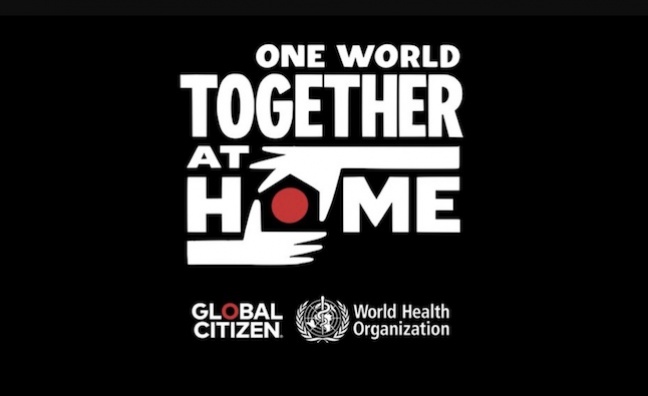At Live Aid, the big draw was having all the planet’s superstars in the same place. For One World: Together At Home – the coronavirus generation’s take on the awareness-raising telethon – the appeal was very much that everyone was somewhere else.
Given the lateness of the previous night’s US show, the BBC opted for a delayed broadcast, enhanced with some UK-centric content in order to stress the vital ‘stay home’ message. Few of the local participants could match the A-list wattage of the assembled US highlights, but there were plenty of game celebrities and shoutouts to heroic key workers (for whom the gig was a thank you from Global Citizen and the World Health Organisation) to give the event the feel of Glastonbury, as reimagined by The One Show.
It goes without saying that everyone watching, as well as performing, was on board with the sentiments of the event, and the tone was impressively, consistently respectful throughout, expertly marshaled by presenters Dermot O’Leary, Claudia Winkleman and Clara Amfo.
That did mean that, musically, there were few wildcards, with most participants going for sombre-but-uplifting covers, from Lizzo’s take on Sam Cooke’s A Change Is Gonna Come to Rag’N’Bone Man’s wiry take on Bob Dylan’s The Times They Are A-Changin’. Less predictable was Shawn Mendes and Camila Cabello’s duet on Louis Armstrong’s What A Wonderful World, with the pair surely proving, once and for all, that they’re a couple by flagrantly breaching social distancing protocols side-by-side at the piano.
Indeed, there were a lot of keyboards in this show. Paul McCartney and Stevie Wonder’s were well-worn and Eddie Vedder’s almost a church organ, while John Legend’s was subtly placed in front of his multiple Grammys (his duet partner on Stand By Me, the UK’s own Sam Smith, managed a background Oscar by way of a comeback). The ultimate power move, however, came from Sir Elton John, who bashed out I’m Still Standing on a baby grand placed in the middle of his outdoor basketball court, a couple of discarded balls and what looked like a recycling bin lingering in the background.
Indeed, with everyone already sold on the brilliant cause – and with no actual fund-raising element meaning there was no need for a Bob Geldof-style ‘Give us your fucking money’ moment – the show was free to concentrate on entertainment – and providing some excellent insights into top musicians’ working from home arrangements. From Jennifer Lopez’s amazing garden to Ellie Goulding’s well-stocked drinks trolley and Billie Eilish and brother Finneas’ compact and bijou set-up, the décor was almost as fascinating as the music.
Some questions remained, however. Was Little Mix’s Perri Edwards really singing from her toilet? And could no one have got her bandmate Jade Thirlwall a dongle so her broadband quality matched her bandmates? Despite such musings, the Mixers’ self-isolating performance of Touch was perhaps the night’s most out-and-out fun moment.
Although it was rivalled, surprisingly, by The Rolling Stones. Their rendition of You Can’t Always Get What You Want came on like those Google Hangouts/Zoom/Microsoft Teams calls we’re all now so familiar with: Mick Jagger was the guy taking the lead; Ronnie Wood the one who pulls funny faces every time he notices the camera is on him; Charlie Watts was busy getting on with his own thing while the call was in progress and Keith Richards was the bewildered technophobe who didn’t even realise his camera was on.
Lady Gaga curated the evening but gladly shared the limelight, chipping in with a light touch take on Charlie Chaplin’s Smile at the start and allowing Celine Dion and Andrea Bocelli to shine on their collaboration on The Prayer (also featuring Legend and Lang Lang) at the event's conclusion.
Many have pondered whether the ongoing lockdown could see a regular music show back on TV. And, with such unpredictable set-ups and further highlights to be found on the iPlayer, Together At Home did offer a possible template for more livestreaming spectaculars, should a broadcaster fancy giving Twitch and co a run for their money by persuading under-employed musicians to give us a regular look at their curtain choices.
Especially as the night’s standout musical moments were often the simplest.
Green Day’s Billie Joe Armstrong – a man who clearly neglected to stock up on punk rock hair gel before the lockdown – offered a bare acoustic take on When September Ends, played over stark images of deserted streets. Goulding sang a rather lovely Your Song over more joyful images of babies born during the crisis. And Taylor Swift contributed a perfectly-pitched, eloquently emotional Soon You’ll Get Better that simply cut through everything.
Originally written about her mother’s cancer battle, and not a song she ever planned to play live, the song somehow encapsulated a situation that, even a few weeks ago, none of us could have imagined.
“This won’t go back to normal, if it ever was,” she sang. Until the days when we can stage gigs like this in actual stadiums with actual audiences again, however, this Livestream Aid was more than enough to bring the music world together, while still keeping it apart.
* For Music Week's livestreaming cover story, see our new issue, available Monday April 20. To make sure you can access Music Week wherever you are, subscribe to our digital issue by clicking here.










